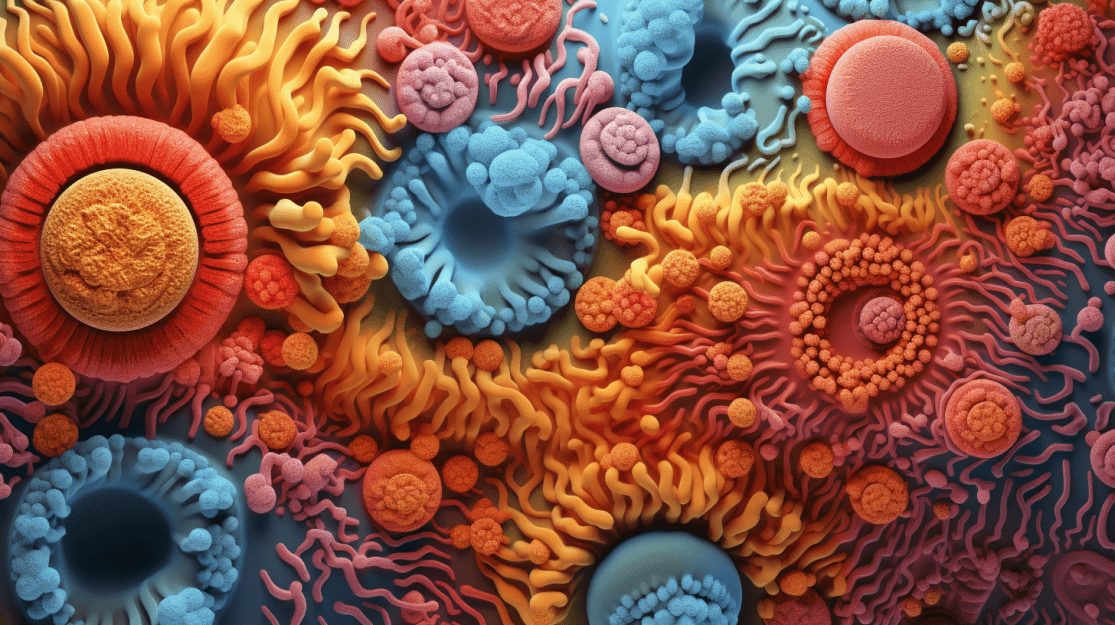
What are Gut Microbes?
The gut is a bustling metropolis of life, teeming with countless microorganisms that include bacteria, fungi, viruses, and more. These microscopic inhabitants are collectively known as the gut microbiota. They play an essential role in our health and overall well-being, shaping various facets of our physiology from digestion to immunity. Fascinatingly, when we talk about cell numbers, it's estimated that microbial cells in our body are on par with our human cells.
To further understand the vastness of our gut's micro-world, it's vital to distinguish between two terms: microbiota and microbiome. The microbiota refers to the actual microorganisms living in a specific environment, such as our gut. In contrast, the microbiome denotes the entirety of the genetic material of these microbes. The genetic diversity these microbes present is truly staggering. While the human genome comprises approximately 20,000-25,000 genes, the collective genes within our microbiome may span millions of unique genes, significantly augmenting our biochemical repertoire.
In a comparative light, the genetic similarity among humans is about 99.9%, but when it comes to our microbiomes, the similarity drops drastically, with individuals sharing only about 20% of their microbiome species.
Research suggests that a diverse gut microbiota is crucial for maintaining good health. However, imbalances in this microbial community, termed dysbiosis, can pave the way for various diseases.
What are Gut Microbes good for? Learn more about their Roles and Functions
Gut Microbe’s Role in Digestion and Nutrient Absorption
Our digestive system is a bustling hub of activity, and the large intestine stands out as a significant participant in this context. The highest concentration of gut microbes is found in the large intestine, making it an essential focal point for understanding their impact on our nutrition.
While our digestive system is well-equipped to break down many of the foods we consume, it's less effective when dealing with complex carbohydrates, such as fibers and resistant starches. Once these undigested materials reach the large intestine, our resident gut microbes spring into action. They break down these complex carbohydrates into short-chain fatty acids (SCFAs), including acetate, propionate, and butyrate. These SCFAs are not merely by-products; they nourish the cells lining our colon and play essential roles in regulating our metabolism and appetite.
In the large intestine, microbial fermentation is in full swing. Here, microbes take on the remaining undigested materials, producing gases such as methane, hydrogen, and carbon dioxide. They also complete the digestion of proteins and peptides. The balance and diversity of our gut microbiota largely determine the nature and impact of these metabolic byproducts on our health.
Beyond digestion, gut microbes in the large intestine also play a pivotal role in nutrient synthesis. Certain bacteria are responsible for producing vitamins, notably biotin and vitamin K. Additionally, these microbes facilitate the absorption of essential minerals like magnesium, calcium, and iron, emphasizing their indispensable role in our overall nutrition.
Gut Microbe’s Role in Metabolic Functions and Energy Regulation
One of the key roles played by our gut microbiota is in the metabolism of undigested carbohydrates, especially complex polysaccharides that are inaccessible to human enzymes. Through the fermentation of these fibers and resistant starches, gut bacteria produce short-chain fatty acids (SCFAs) like butyrate, propionate, and acetate. These SCFAs serve as vital energy sources for our colon cells, and they also play significant roles in regulating inflammation, gut barrier function, and even appetite.
A striking testament to the efficiency of this microbial digestion is the energy it confers to us. If it weren't for our gut microbes, we'd struggle to extract many nutrients and energy from various foods. Some studies suggest that without the fermentation processes driven by our gut microbiota, we might need to consume significantly more food to gain the same amount of energy. This highlights the symbiotic relationship we share with our gut bacteria: we provide them with food, and in return, they bolster our energy extraction and nutrient absorption capacities.
Gut Microbe’s Link to Mood and Behavior Regulation
Emerging research points to the gut-brain axis, a bidirectional communication system between our gut and our brain. Gut microbes can produce neurotransmitters and other compounds that can influence our mood, behavior, and even cognitive function.
Gut Microbe & the Immune System Regulation
Our gut microbiota plays a pivotal role in training and modulating our immune system. By interacting with intestinal immune cells, these microbes help in the development of immune responses, determining what's recognized as a friend and what's seen as a foe. This interaction ensures that our immune system is not overly reactive, which can lead to autoimmune disorders, or underactive, which might increase susceptibility to infections.
How to Maintain A Healthy Gut Microbiota?
A balanced and diverse gut microbiota is crucial for maintaining good health. Factors like diet, lifestyle, and medication can significantly influence the composition and function of these microbial communities.
Diet: A diet rich in fibers, prebiotics, and fermented foods can encourage the growth of beneficial bacteria. Prebiotics, found in foods like onions, garlic, and asparagus, act as food for our gut bacteria, while fermented foods like yogurt, kefir, and kimchi introduce beneficial probiotics to our system[^6^].
Lifestyle: Regular exercise has been shown to positively impact gut health by promoting the growth of beneficial bacteria. Stress, on the other hand, can be detrimental. Chronic stress can alter the gut microbiota's composition, leading to dysbiosis[^7^].
Avoid Overuse of Antibiotics: While antibiotics are sometimes necessary, their prolonged or unnecessary use can disrupt the balance of the gut microbiota. It's essential to use them judiciously and under the guidance of a healthcare professional.
Stay Hydrated: Drinking plenty of water not only benefits the skin and kidneys but also the gut. Proper hydration helps maintain the mucosal lining of the intestines and aids in promoting the balance of good bacteria in the gut[^8^].
Given the influential role of gut microbes in various aspects of our health, it's essential to foster habits that support a healthy and balanced gut ecosystem. From influencing our digestion and metabolism to playing a crucial role in our immune responses and even impacting our mood, these tiny organisms carry significant weight in the orchestration of our overall health.
Summary
Gut microbes represent a fascinating dimension of our health. This complex community of bacteria, fungi, and viruses influences numerous facets of our physiology, from the extraction of energy from food to the modulation of our mood. The sheer number of these microbes and their genetic diversity are staggering, rivaling and even exceeding our own in many aspects. By understanding their multifaceted roles and fostering habits that promote a balanced gut ecosystem, we can harness the potential of these microscopic allies for better health and well-being.
Sources:
Sender, R., Fuchs, S., & Milo, R. (2016). Revised Estimates for the Number of Human and Bacteria Cells in the Body. PLOS Biology, 14(8), e1002533.
Qin, J., Li, R., Raes, J., Arumugam, M., Burgdorf, K. S., Manichanh, C., ... & Mende, D. R. (2010). A human gut microbial gene catalogue established by metagenomic sequencing. Nature, 464(7285), 59-65.
Li, J., Jia, H., Cai, X., Zhong, H., Feng, Q., Sunagawa, S., ... & Zhao, L. (2014). An integrated catalog of reference genes in the human gut microbiome. Nature Biotechnology, 32(8), 834-841.
Cummings, J. H., & Macfarlane, G. T. (1991). The control and consequences of bacterial fermentation in the human colon. Journal of Applied Bacteriology, 70(6), 443-459.
Flint, H. J., Scott, K. P., Duncan, S. H., Louis, P., & Forano, E. (2012). Microbial degradation of complex carbohydrates in the gut. Gut Microbes, 3(4), 289-306.
Gibson, G. R., Hutkins, R., Sanders, M. E., Prescott, S. L., Reimer, R. A., Salminen, S. J., ... & Reid, G. (2017). Expert consensus document: The International Scientific Association for Probiotics and Prebiotics (ISAPP) consensus statement on the definition and scope of prebiotics. Nature Reviews Gastroenterology & Hepatology, 14(8), 491-502.
Monda, V., Villano, I., Messina, A., Valenzano, A., Esposito, T., Moscatelli, F., ... & Cibelli, G. (2017). Exercise Modifies the Gut Microbiota with Positive Health Effects. Oxidative Medicine and Cellular Longevity, 2017.
Popkin, B. M., D'Anci, K. E., & Rosenberg, I. H. (2010). Water, hydration, and health. Nutrition reviews, 68(8), 439-458.
Krajmalnik-Brown, R., Ilhan, Z. E., Kang, D. W., & DiBaise, J. K. (2012). Effects of gut microbes on nutrient absorption and energy regulation. Nutrition in Clinical Practice, 27(2), 201-214.
Your 14-Day Journey to Gut Health Begins Now!
Don't let digestive issues hold you back any longer—take the first step towards a healthier, happier you today






